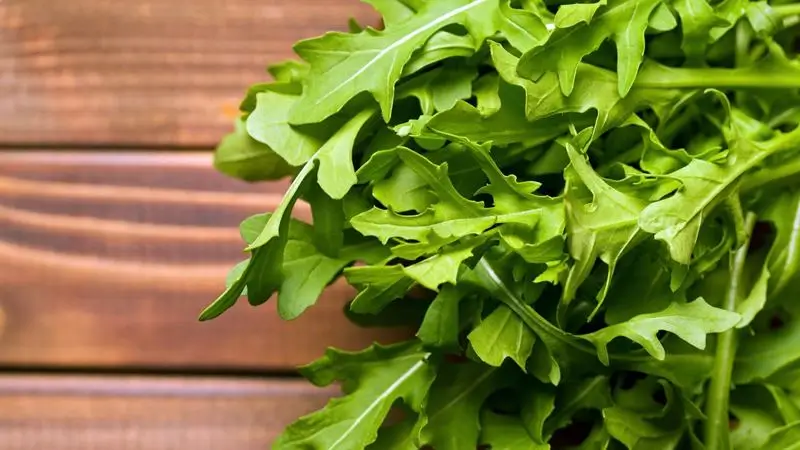Have you ever heard of Rocket Leaves? What are Rocket Leaves?
Are you a home cook looking to add a touch to your salads, pizzas, or pasta dishes? Look no further than rocket leaves. This leafy green vegetable boasts a unique flavor profile and a surprising amount of nutrients, making it a popular choice for kitchens worldwide.
Rocket Leaves, also known as arugula, rocket, roquette, and by many other names are a type of green that became wildly popular in the 1990s in the United States. They were known throughout Europe and were especially popular in France and Italy. We get the name rocket greens from the French roquette. The spicy taste of the greens may be in part due to the fact that they are relatives of watercress and radish greens.
People commonly add fresh arugula to salads, but it also works well incorporated into pasta, casseroles, and sauces, just like other leafy greens.
Arugula is easy to grow and perfect for a windowsill garden. When store-bought or picked fresh, people should store arugula in the refrigerator and use it within a few days of purchase.
Rocket leaves is a peppery leafy green that provides many of the same health benefits as other cruciferous vegetables of the same family, which include broccoli, kale, and Brussels sprouts. It has a high nutrient content and makes an excellent and healthful addition to most diets.
A varied diet rich in leafy greens can help prevent health problems, including cardiovascular disease, obesity, and cancer.
Benefits of Rocket Leaves

Research has specifically linked arugula and other cruciferous vegetables with the following health benefits:
1. Reduced Cancer Risk
While an overall healthful, vegetable-rich diet reduces a person’s cancer risk, studies have shown that certain groups of vegetables can have specific anticancer benefits.
2. Osteoporosis Prevention
Arugula is high in several key nutrients for bone health, including calcium and vitamin K.
The Office of Dietary Statistics Trusted Source state that vitamin K is involved in bone metabolism and that a deficiency can increase the risk of bone fracture. Leafy green vegetables are one of the primary dietary sources of vitamin K.
3. Diabetes
Several review studies have found that eating vegetables reduces a person’s risk of developing type 2 diabetes. A review study from 2016Trusted Source reports that leafy green vegetables are especially beneficial.
One test tube study Trusted Source showed that arugula extract had antidiabetic effects in mouse skeletal muscle cells. They produced this effect by stimulating glucose uptake in the cells.
4. Heart Health
Vegetable intake, specifically cruciferous vegetables, has protective effects on the heart.
A 2017 meta-analysis Trusted Source reports that diets rich in cruciferous vegetables, salads, and green leafy vegetables have links with a reduced risk of cardiovascular disease.
In addition, a 2018 study published in the Journal of the American Heart Association reported that consuming a diet high in cruciferous vegetables could reduce atherosclerosis in older women. Atherosclerosis is a common condition where plaque builds up in the arteries, increasing a person’s risk of cardiovascular problems.
According to the United States Department for Agriculture (USDA) nutrient database, a cup of arugula weighing about 20 grams (g) contains approximately 5 calories.
A cup of arugula also contains:
- 0.516 g of protein
- 0.132 g of fat
According to an adult’s daily nutritional goals, set out in the FDA’s daily values (DV), a cup of arugula will provide:
- 27.7% of vitamin K
- 3.2% of calcium
- 2.5% of vitamin C
Arugula also contains some iron, folate, magnesium, potassium, and provitamin A.
Rocket Leaves, A Blast of Flavor

Rocket leaves is a cool-season annual herb belonging to the Brassicaceae family, which also includes Cabbage, Broccoli, and Kale. This leafy green vegetable is native to the Mediterranean region and has been cultivated for centuries for its distinctive flavor and potential health benefits
Rocket leaves are prized for their unique flavor profile. They possess a peppery bite, with some describing it as slightly mustardy or nuty. The intensity of the peppery flavor can vary depending on the growing conditions and harvesting time. Generally, younger rocket leaves tend to be milder, while mature leaves offer a more pronounced peppery kick.
Rocket leaves are easily identifiable by their appearance. They are small, lobed leaves with a dark green color, often featuring a reddish tinge on the veins. The leaves have a feathery texture and grow in a rosette pattern on the plant’s stem, adding a touch of elegance to any dish.
Here are some ways to incorporate this flavorful green into your meals:
Salads, rocket leaves are a natural fit for salads, adding a delightful peppery counterpoint to milder greens like lettuce and spinach. Pair them with creamy cheeses, toasted nuts, and a light vinaigrette for a refreshing salad experience.
Sandwiches, elevate your next sandwich with a layer of rocket leaves. The peppery bite complements various fillings like roasted vegetables, grilled meats, or creamy cheeses.
Pizza, for a gourmet pizza experience, add a sprinkle of rocket leaves just after the pizza comes out of the oven. The heat will slightly wilt the leaves, releasing their peppery aroma and adding a unique textural contrast to the melty cheese.
Pasta Dishes, toss a handful of rocket leaves into your pasta dish just before serving. The peppery leaves will blend beautifully with creamy sauces like pesto or Alfredo, adding a burst of flavor and a touch of green.
Rocket leaves, with their unique flavor profile and potential health benefits, are a valuable addition to any kitchen. So next time you’re looking to add a touch of peppery zing to your dishes, reach for a bag of rocket leaves and explore the culinary possibilities!

Leave a Reply